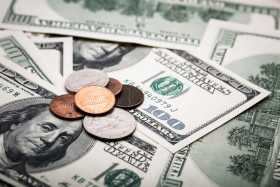The US dollar is mixed against several major currency rivals midweek after new lower-than-expected inflation data was released. Prices have proven to be major drivers of the greenback this week, mainly because there have been little updates to the US-China trade dispute and the brief US-Mexico trade spat concluded. On monetary policy, it will likely be speculation until the next Federal Reserve meeting.
According to the Bureau of Labor Statistics (BLS), US consumer prices rose 0.1% in May, up from the 0.3% jump in the previous month. The market had forecast a 0.3% gain. The core inflation rate also edged up 0.1%, below the median estimate of 0.2%.
On Tuesday, the US government reported that the seasonally adjusted producer price index (PPI) edged up 0.1% last month, which did meet the consensus. It was, however, a drop from Aprilâs 0.2% increase and represented the slowest pace of growth in about a year.
Elsewhere on the price front, investors will comb through import and export prices from May. Analysts are anticipating a 0.3% decline in import prices and a 0.1% slide in export prices.
In the housing market, mortgage applications surged 26.8% in the week ending June 7, up from a putrid 1.5% in the previous week, reports the Mortgage Bankers Association (MBA). The MBA also reported that the 30-year mortgage rate came in at 4.12%, down from 4.23% in the prior week.
Later this week, retail sales, manufacturing output, business inventories, and consumer sentiment will be released.
At the end of June, the Federal Open Market Committee (FOMC) will hold a policy meeting. It is not expected to pull the trigger on a rate cut, but the general consensus is that the central bank could reduce interest rates as early as July. CME Group FedWatch data suggest that markets think that more than one rate cut could take place in 2019.
Speaking in an interview with Bloomberg TV, Commerce Secretary Wilbur Ross thinks the last rate hike in 2018 was âprematureâ:
I think the Fed taking a more cautious attitude on rates and reconsidering, in effect, the last rate increase that they put in, I think thatâs good. I think they should reconsider. I think itâs quite likely that that last increase was, at best, premature.
The USD/CAD currency pair climbed 0.18% to 1.3309, from an opening of 1.3284, at 16:41 GMT on Wednesday. The EUR/USD tumbled 0.26% to 1.1298, from an opening of 1.1333.
If you have any questions, comments, or opinions regarding the US Dollar, feel free to post them using the commentary form below.
